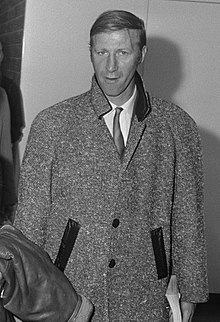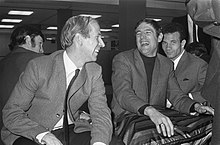Norman Hunter (footballer)
Norman Hunter (29 October 1943 – 17 April 2020) was an English professional footballer who played for Leeds United, Bristol City, Barnsley and the England national team.[18] This was significant for young players like Hunter and Bremner because Revie initiated a youth development policy which was the basis of the club's future success.He and Paul Reaney made their debuts in a Second Division match against Swansea Town at Vetch Field on 8 September 1962, Leeds winning 2–0.[25] Although they were newly promoted,[22] Leeds had an exceptional season in 1964–65 and performed a "runners-up double" by finishing second in the league to Manchester United on goal average;[26] and losing 2–1, after extra time, to Liverpool in the 1965 FA Cup final.[30][31] Hunter continued to play a key role in the Leeds defence and his form impressed England manager Alf Ramsey, who included him in the squad for a match against Spain at the Santiago Bernabéu Stadium in Madrid on 8 December 1965.[32] He played as a defensive midfielder and that allowed Ramsey to deploy both Bobby Charlton and Alan Ball in more attacking roles as England won 2–0.[37][38] Hunter was a key player for Leeds throughout this period as they became one of the strongest teams in Europe by reaching five European finals while he played for them.In the League Cup final at Wembley Stadium, they met Arsenal and won the match with a goal scored by Terry Cooper after 20 minutes.[45] Ferencváros had to play their normal attacking game in this match and the Leeds defence, including Hunter, faced "its sternest test yet".[46] Hunter and Jack Charlton were outstanding for Leeds in the first leg, in which they had to contain Helmut Haller, Roberto Bettega, Franco Causio, and Pietro Anastasi, who at the time was the world's most expensive footballer.Even Norman Hunter was looking weary and that above all else shows the amount of strain United have been through because if there is an iron man in British football today it is Norman Hunter.Before the 1972 FA Cup final at Wembley, some Leeds fans displayed a banner reading 'Norman Bites Yer Legs' and, after ITV had screened it several times, Hunter was thereafter nicknamed "Bites Yer Legs".[57][58] Towards the end of his career with Leeds, Hunter was in their team for a league match against Derby County at the Baseball Ground on 1 November 1975.Returning to Leeds, Clarke departed at the end of the season and Hunter replaced him as team manager, initially as a player-manager.[66] Hunter scored the winning goal against Spain in England's quarter-final qualifying round for the 1968 European Championship, he then started in both the 1–0 semi final defeat to Yugoslavia and the 2–0 victory over the Soviet Union in the bronze medal match.[69] He spent a short part of the 1970 season injured but he was in Alf Ramsey's squad for the summer's World Cup in Mexico, however his only appearance in the tournament was coming on as a late substitute in the 3–2 defeat by West Germany.Poland quickly made a counter-attack allowing Grzegorz Lato to run clear and set up Jan Domarski to score.[29] On 11 June 1967, he travelled to Montreal with the Football Association XI to play in an exhibition match against Borussia Dortmund as part of an Expo International Tournament.Revie pointed out that Hunter could read the game so that he was invariably well-positioned, and would win the ball by performing committed and uncompromising tackles when necessary.[74] Like his contemporaries Tommy "Anfield Iron" Smith of Liverpool, Nobby Stiles of Manchester United and Ron "Chopper" Harris of Chelsea, Hunter always had the reputation of being a hard man on the field.[82] In 1988, Hunter was employed as a coach at Leeds under Billy Bremner, but he was dismissed upon the appointment of Howard Wilkinson as manager on 10 October that year.He regularly attended Leeds matches and participated in club-hosted conferences and events; the eponymous "Norman Hunter Suite" is located in the West Stand at Elland Road.[89] In November 2007, following a campaign led by The FA, members of England's 1966 World Cup squad who did not play in the final, including Hunter, were belatedly awarded winner's medals by FIFA.Based on David Peace's 2006 book, The Damned Utd, it dramatised Brian Clough's ill-fated 44 days as manager of Leeds United in 1974.[92] Both have been the subject of litigation: Johnny Giles successfully sued the book's publishers for libel;[92] Dave Mackay won an apology and undisclosed damages from the makers of the film.[93] The World Soccer review says, as an aside to Giles' legal action: 'Norman Hunter hardly says anything [in the book], but he's still alive so escapes Peace's hatchet job'.[95] The film's negative portrayal of Hunter is sharply at odds with his real off-the-field persona, evidenced by the many tributes paid to him before and after his death, as 'an amiable, popular and lovable man'.[23][11][4] Hunter was one of the contributors to Phil Rostron's retaliatory We Are the Damned United, published in August 2009, which sought to set the record straight about Leeds under Clough.[96] In 2013, Hunter was diagnosed with rare cancer type Chronic Lymphocytic Leukaemia (CLL), which attacks blood and bone marrow.This is an annual charity event at Horsforth Golf Club, where Hunter held membership, to raise funds for CLL cancer research in Leeds.



L–R : Harold Shepherdson , Colin Bell , Alf Ramsey , Norman Hunter, Jack Charlton .


Norman HunterEighton BanksCentre-backLeeds UnitedBristol CityBarnsleyFootball LeagueEngland U23EnglandRotherham UnitedfootballFIFA World CupUEFA European ChampionshipfootballerEngland national teammanageddefensive midfielderLeague ChampionshipFA CupBobby MoorePFA Players' Player of the YearFootball League 100 LegendsCOVID-19Elland RoadNorman Hunter South StandBirtley Secondary Modern Schooljunior footballBradford Park Avenue Juniorselectrical fitterFirst Divisionteam managerJack TaylorBill LambtonDon RevieSunderlandBilly BremnerSecond Division1955–56Jack CharltonJohn Charles1959–60 seasonplayer-managerPaul ReaneyPeter LorimerTerry CooperEddie GrayPaul Madeley1962–63 seasonSwansea TownVetch Field1963–641964–65Football League XIIrish League XIBelfastEngland under-23Wales u-23Racecourse GroundWrexhamGary SprakeManchester Unitedgoal averageextra timeLiverpool1965 FA Cup final1965–66 seasonGeorge MulhallAlf RamseySantiago Bernabéu StadiumMadridsubstituteJoe BakerBobby CharltonAlan BallBurnleyWest Bromwich AlbionLeague CupChelseaStamford Bridge1965–66 Inter-Cities Fairs CupTorinoSC LeipzigValenciaÚjpesti DózsaReal ZaragozaInter-Cities Fairs CupDinamo ZagrebFootball League CupLeague Cup finalWembley StadiumArsenalthe finalHibernianRangersDundeeFerencvárosMick JonesBudapestWarsaw Pact invasion of CzechoslovakiaJuventusaway goals ruleHelmut HallerRoberto BettegaFranco CausioPietro AnastasiYorkshire Evening Post1972 FA Cup finalIan Porterfield1973 FA Cup finalAllan ClarkedislocatedFA Cup finalAC MilanEuropean Cup Winners' Cup finalKaftanzoglio StadiumThessalonikithe 1973–74 seasonEuropean Cup1975 European Cup finalBayern MunichDerby CountyBaseball GroundFrancis Leepenaltytaking a divefouled